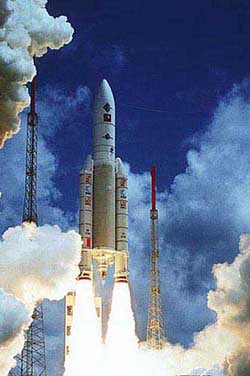

|
Your Most Trusted Source of Foreign
News and Views About the United States
|
Translated By Mike Goeden
October 25, 2005
Original Article (French) De Defense

The unfolding case of the ten small C-295
transport planes that

The debacle surrounding the C-295s (light
transport planes without the slightest offensive or defensive military
capability) perfectly reflects the absurdity and arbitrariness of the situation. The
block on their sale has been attributed to

The conflict over the C-295s is but one of many such cases testifying to the intrusive and arbitrary character of the ITAR legislation. However, the legality of such legislation is not in question, since any country acquiring American components necessarily agrees to the provisions set by ITAR. Up until now, there has been no significant backlash - in other words, no specific boycott of American components.
Contrary to rumor, there exist more than
enough substitutes for such American components sold to equip foreign systems.
The

It would seem that as a result of such an extreme case as the blocked C-295s (unjustified interference from Washington in the foreign sale of non-military aircraft), a counter reaction could be expected. Or, rather, that the various options for a response be brought forward to the point of forcing concrete action. With this in mind, Defense News speculates at length on the possible ramifications of ITAR:
A handful of European companies already
advertise that some of their wares are “ITAR-free” - that is, they are
not subjected to the
The worrisome part of that for
EADS and other European companies have
been working to develop military components that are not subject to a
EADS is following in the footsteps
of France’s Alcatel Space, which has made it company policy since 2002
to build ITAR-free communications satellites to avoid

Morotta, a British maker of spacecraft propulsion and propellant management equipment, advertises that its products “are European and hold ITAR-free status.” And when Surrey Satellite Technology, another British firm, touts the “features” of its satellite propulsion systems, “completely ITAR- free” is at the top of the list.
This is bad news for the
An official at the French armaments
agency DGA said the
Another important factor to consider: such an evolution should further encourage the current consolidation of the European arms manufacturers, as well as opening up the arms market within the European Union. A European source cited by Defense News argues just that: the issue does raise interesting questions about why [EU] member states should think about their future common defense market. They’re not getting the bang for the buck they need - and that’s the main rationale [for creating a common defense market] - but they’re also vulnerable to these sort of things. What the source fails to mention is the logical expectation that this affair should, in addition, lead to the construction of a European market based upon the very same criteria: a market just as protectionist and aggressive with regard to foreigners as its American counterpart, and which functions according to the same purchasing philosophy (in this case, the promotion of a "Buy European" mentality, just as the tendency to "Buy American" is already present in the U.S.).
As usual, Europe will most likely attempt to avoid the fundamental questions raised by this affair. However, both the absurdity and enormity of the C-295 incident will complicate any such attempt. The key questions to consider are as follows:
--How is one to pursue military and technological
cooperation with a partner proceeding from a decidedly unilateral perspective,
at once especially aggressive and intrusive, and which is hostile toward
even its supposed allies? The
--How can Europe accept its dependence upon such a doubtful and erratic foreign policy,
as its commercial and ideological allegiance to the
Of course, such concerns are hardly new. Most European countries - their industries at the forefront - have persistently reacted in the same manner. The source of their reasoning has remained the same: intellectual cowardice concealed by the idiotic profit motive (idiotic, since the Europeans are generally the losers in any such agreement with the Americans). It is always interesting to consider just how far such sloppy reasoning can be stretched - and to how great an extent the Europeans will suffer such treatment without eventually striking back. It is also remarkable that two British companies (Morotta and Surrey Satellite Technology) are found among the three countries cited by Defense News to have opted for an avowed policy of avoiding U.S.-made components.